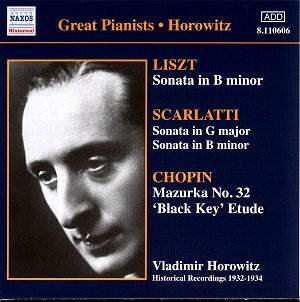To say that this is the greatest recording of
the Liszt Sonata in b ever made is only a slight exaggeration.
There are several other recordings that deserve to be at least
considered as well, for instance Sir Clifford Curzon on Decca
and Lazar Berman on Melodiya. What makes Horowitz such a great
Liszt interpreter is not only his impeccable virtuoso technique,
but that, like Liszt, he was something of a ham and enjoyed showing
off, making the most difficult passages sound especially easy,
making use of the grand gesture. His later recording of Lisztís
arrangement of Mendelssohnís Wedding March is hilariously
and brilliantly irreverent, showing this quality to perfection.
Yet in a work like Funerailles he could be a harrowing
tragedian.
The Rimsky-Korsakov comes across brilliantly,
better to my taste than any of Rachmaninoffís own recordings.
By the time recording technology matured, Rachmaninoff was so
bored with playing his own bonbons that he could not put any life
or grace into his sound.
As somewhat of a Scarlatti specialist, I have
never cared for Horowitzís Scarlatti no matter what everybody
else in the world says. I think he mocks it, plays with it like
a cat with a mouse, has no real respect for the music at all,
and I urge listeners to seek out George Malcolm or Fernando Valenti,
especially for K87. But nobody is going to buy this disk just
for the Scarlatti anyway, and most Horowitz fans will go on loving
his Scarlatti and youíre welcome to it.
It is a pleasure to have in the repertoire this
recording of a Haydn Sonata, even if the sound is distant and
bass heavy, but this is the original recordistís fault, not that
of Mr. Obert-Thorn. In contrast with the Scarlatti, Horowitz takes
Haydn very seriously and plays it with that kaleidoscopic interplay
of moods from humorous to sad, playful to grand, that was Haydnís
trademark and remains the despair of less talented interpreters.
Horowitz was one of the few pianists to play Haydn sonatas regularly,
and we need more of them today.
Some composers have to write teaching pieces
to get their music played at all, but Robert Schumann was fortunate
in that anything he wrote would be immediately played in concert
by the two greatest living pianists, his wife Clara and his friend
and admirer Franz Liszt. Hence Schumannís work remains the virtuosoís
domain and Horowitz has always been supreme interpreter of many
of the grander works. These two pieces, exquisitely played, make
a nice contrast of moods.
The 1926 collaborative ballet LíEventail de
Jeanne, with one movement each by Auric, Delannoy, Ferroud,
Ibert, Milhaud, Poulenc, Ravel, Roland-Manuel and Florent Schmitt
challenged most of them to produce tiny masterpieces, simultaneously
in both piano and orchestral versions. This Pastourelle
by Poulenc is one his better efforts, played here with thoughtful
intensity by Horowitz. Others play it off a little lighter and
that works, too. Poulencís Toccata is another of the many
works that only Horowitz can play credibly at all.
Iím going to get in trouble again, but I feel
that Chopin is mostly third rate music (excepting of course the
Third Sonata) and the only reason we hear so much of it is because
it is so easy to play and makes such a great effect. Horowitz
should be ashamed of himself for wasting his talent on such trifles,
but everybody deserves to have a little fun now and then, and
Chopin lovers want to hear everybody play it. But just between
you and me, Guiomar Novaes does better with the Etudes
and Tamas Vasary does better with the Mazurkas because
neither player tries to pump them up into virtuoso vehicles. Both
these other recordings are available at low cost.
The Stravinsky Petrushka excerpt is well
played, but for this work better sound is essential, and other
pianists, e.g. Gina Bachauer, do it as well as Horowitz. It actually
must be easier to play than it sounds because everybody seems
to be able to make it sound very good.
The Debussy is transcendently beautiful, making
one wish Horowitz had specalized more in this composer than in
Scarlatti; but over his career Horowitz only recorded a total
of about half a dozen pieces by Debussy, including, of course,
Clair de Lune. This etude is one he played frequently and
nobody else comes close on this one.
In the past I have been critical of Mr. Obert-Thorn
for leaving too much hiss in his restorations to take advantage
of the common auditory illusion that allows the ear to select
from the hiss the missing overtones and hence create a spurious
sensation of presence, air and ambience when in fact the frequencies
are just not there. However, here I have no such complaints. Hiss
has been reduced to sensible levels and the sound is generally
excellent, most especially for the Liszt work. Whatever qualifications
I may have as a restoration engineer, I could never touch Mr.
Obert-Thornís experience and ability to deal elegantly with truly
difficult original material, as here.
Paul Shoemaker
See also review
by Christopher Howell

